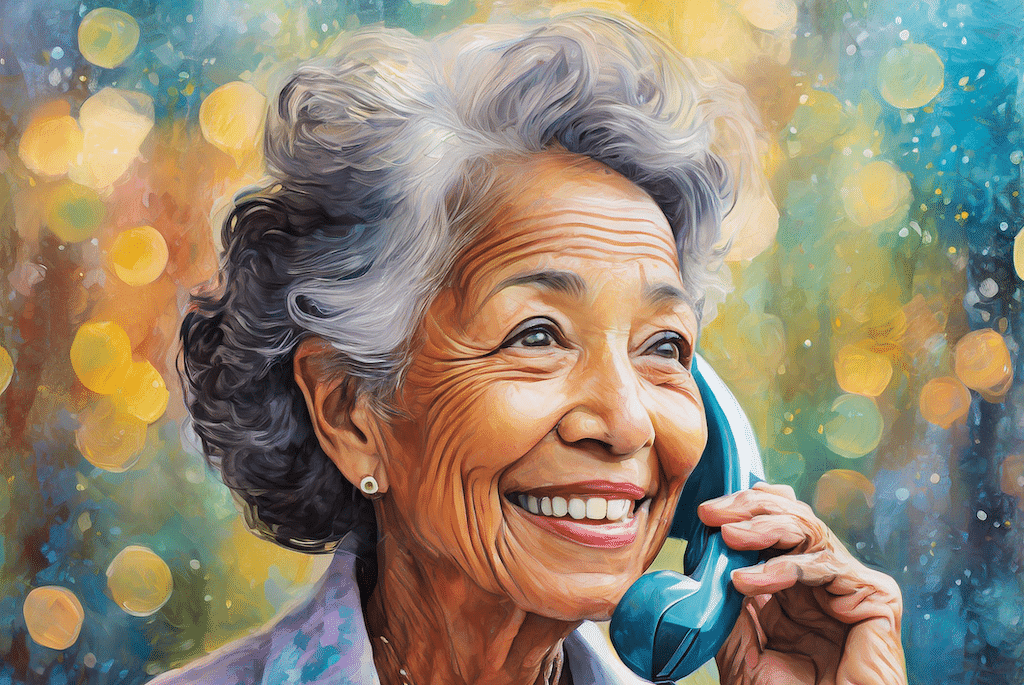
Effective Telephone Strategies for Alzheimer’s and Dementia Caregivers
June is Alzheimer’s and Brain Awareness Month, a time to shine a light on the millions of individuals worldwide affected by Alzheimer’s and other forms of dementia. It’s a period for raising awareness, showing support for the affected, and fostering a better understanding of the brain’s health. This article offers practical conversation starters and communication tips that are especially beneficial for phone conversations with loved ones affected by Alzheimer’s or dementia, ensuring that whether they’re using a cell phone or a specialized landline service for seniors, your dialogue remains meaningful and connected.
Communicating with Someone with Dementia
When speaking to someone with dementia, it’s essential to use short, clear sentences and enunciate clearly. Speaking at an even pace allows the individual ample time to process the conversation. Repetition is also helpful, but it’s crucial to repeat sentences in exactly the same way to avoid confusion. Patience, positivity, and reassurance go a long way in making the conversation pleasant and fruitful. Encouraging the sharing of stories, especially from youth, can be particularly engaging, as these memories are often vivid and cherished.
Related: Long-Distance Caregiving
Conversation Starters
Open-ended questions are excellent conversation starters, focusing on positive experiences and memories. Here are some suggestions:
- “What was your favorite job, and what did you enjoy most about it?”
- “Do you have a pet that holds a special place in your heart? What was your favorite memory with them?”
- “What vacation stands out to you as the most enjoyable, and why?”
- “What hobbies bring you joy, and how did you get started with them?”
- “Is there a family memory or holiday tradition that you particularly love?”
- “How did you meet your spouse or best friend, and what drew you to them?”
- “What kind of music or movies do you enjoy, and do you have a favorite?”
- “What piece of advice has stuck with you over the years?”
- “Tell me about your family. What are some of the things you’re most proud of?”
Connecting Over Shared Experiences
Sharing personal experiences can create a bridge to more profound conversations. For example:
- “I played sports in school. Did you have a favorite sport to play or watch?”
- “I’m spending time with my dog, Princess. Did you have a pet growing up? What were they like?”
- “I loved riding bikes as a kid. Did you enjoy biking, and where was your favorite place to go?”
- “Visiting the farm was a highlight of my childhood. What was it like where you grew up?”
- “The weather is beautiful today. What’s your favorite season, and what do you like to do during that time?”
The Role of teleCalm’s Caregiver Service
Incorporating teleCalm’s Caregiver service into this dynamic can be a game-changer. This service is designed to facilitate worry-free communication between caregivers and their loved ones with Alzheimer’s or dementia. The service ensures that individuals can stay in touch with family and friends, helping to ward off feelings of isolation and loneliness. It provides tools that make phone calls simpler and less stressful for everyone involved, ensuring that conversations are a source of joy and not frustration.
teleCalm’s Caregiver service is a landline phone service for seniors, offering features such as filtering out unwanted calls, both incoming and outgoing, while providing caregivers the ability to manage the service remotely to ensure safety and ease of use. By removing common communication barriers, teleCalm helps maintain the emotional well-being of individuals with dementia and their families, fostering a sense of normalcy and connection despite the challenges posed by the condition.
Click Here to see how teleCalm can help seniors stay connected and reduce isolation!
Conclusion
Communication is a powerful tool in maintaining relationships and providing comfort to those with Alzheimer’s or dementia. By using the strategies outlined above and leveraging services like teleCalm’s Caregiver landline phone service for seniors, we can create a supportive environment that fosters connection and reduces the impact of isolation.
Let’s use Alzheimer’s and Brain Awareness Month to spread knowledge, offer support, and make a positive difference in the lives of those affected by dementia. Remember, every conversation is an opportunity to show love, respect, and care.


